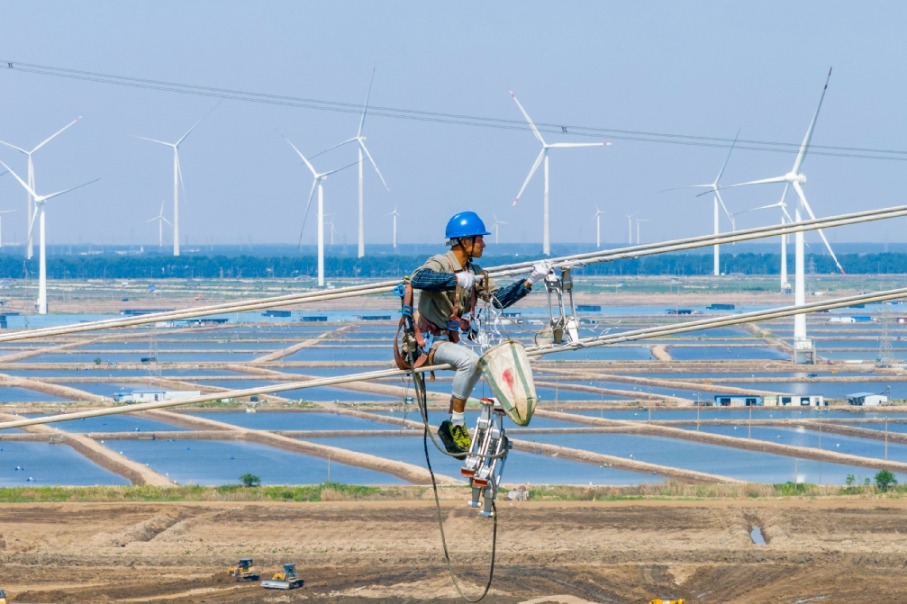Rate hikes may help tame inflation


|
Policymakers will continue to find ways to keep surging inflation at bay, and resort to more rate hikes in the next few months, leading economists say.
The latest rate hike, which was announced on the last day of the Chinese New Year holidays, is a clear indication that Beijing is determined to stamp out inflationary pressures in the world's second-largest economy.
The People's Bank of China (PBOC), the central bank, hiked interests rates on Feb 8, the third time since mid-October, to mop up excess liquidity and tame surging inflation.
Effective Feb 9, the benchmark one-year lending rate rose to 6.06 percent from 5.81 percent, while the one-year deposit rate went up to 3 percent from 2.75 percent.
While the rate hike was on anticipated lines, it was the timing that surprised most analysts and economists, especially as it came a day before the mainland stock market reopened for trading.
The Shanghai Composite Index, a major gauge of the mainland market, dropped nearly 1 percent on Feb 9, the first trading day of "the Year of the Rabbit".
"The move, in our view, is probably a direct response to a surge in the consumer price index (CPI) for January. The January CPI may rise to 5.6 percent year-on-year from 4.6 percent in December as the Chinese New Year holidays and the inclement weather nationwide caused a surge in food prices," says Nomura economist Chi Chun in a research note.
"We believe the PBOC may have chosen to do so in anticipation of another high reading of CPI inflation in January," say economists Qiao Hong and Song Yu from Goldman Sachs Group.
The CPI rose 4.6 percent in December after jumping to a 28-month high of 5.1 percent in November.
The CPI data for January is set to be announced on Feb 15.
Inflation fears have surged after the world's second-largest economy saw its growth expand by 9.8 percent in the fourth quarter of 2010, compared with 9.6 percent in the third quarter.
"The risk of rising inflation cannot be neglected because most of the major economies are expected to shore up their growth by maintaining an easy monetary stance. As a result, a large amount of capital will flow into the emerging economies," the PBOC said in a report published on Jan 30.
It added that rising costs for labor and resources are contributory factors for inflation.
To keep inflation at bay, the central bank may resort to three more rate hikes of 25 basis points each this year, says Chi from Nomura Securities.
Du Zhengzheng, a macro-economist at Bohai Securities, feels that inflation will rise by 4 percent year-on-year in the first half of 2011, after surging to 5.2 percent in January.
"The pressure of increasing inflation has forced the PBOC to take action."
He says the central bank will not raise interest rates again during the first quarter, but may increase the reserve requirement ratio for banks.
Dong Xian'an, chief economist at Industrial Securities, feels that there is still room to increase interest rates by 50 basis points throughout the year.
China has been facing the challenge of excessive liquidity since late 2008, when the government initiated stimulus measures worth $586 billion (430 billion euros) and adopted a "moderately loose" monetary policy to propel an economy battered by the global financial crisis.
In 2010, new yuan loans reached 7.95 trillion yuan (885 billion euros), exceeding the government's target of 7.5 trillion yuan, while inflation jumped 3.3 percent year-on-year, exceeding the officially set ceiling of 3 percent.
In a December survey by the central bank, 74 percent of respondents said they were dissatisfied with rising inflation.
To combat inflation, China raised the reserve requirement ratio for banks six times and increased interest rates twice in 2010. The reserve ratio was again raised on Jan 14.
To curb inflation and control financial risks, the central bank announced earlier that it had set the growth rate target for M2, the broad measure of money supply that covers cash in circulation and all deposits, at 16 percent for 2011.
M2 rose by 19.7 percent in 2010 over the previous year, exceeding the officially set target of 17 percent, according to the central bank on Jan 11.
The PBOC also vowed to strengthen control over yuan lending, corporate debt and equity financing, to combat inflation.
Today's Top News
- Nepal's hydropower a climate change solution
- UN Charter still guiding compass of humankind
- Leaders pledge to strengthen Sino-Senegalese relations
- China, Ecuador to support each other's core interests
- Details on trade talks confirmed
- Bolder steps likely to boost demand






























